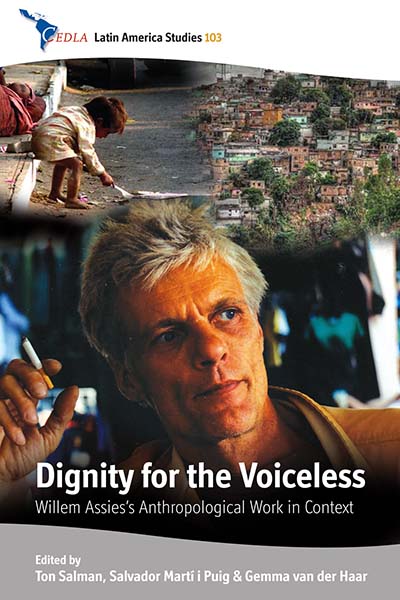 Renowned Dutch anthropologist Willem Assies’ lifework was a study of Latin American politics. Up to his unexpected death in 2010, Assies had made strides in bringing awareness to the situations of the downtrodden, those considered “voiceless.” In Dignity for the Voiceless: Willem Assies’s Anthropological Work in Context, editors Ton Salman, Salvador Marti i Puig, and Gemma van der Haar have given the political anthropologist his own voice once again. Following, the editors provide further insight into their recently published volume.
Renowned Dutch anthropologist Willem Assies’ lifework was a study of Latin American politics. Up to his unexpected death in 2010, Assies had made strides in bringing awareness to the situations of the downtrodden, those considered “voiceless.” In Dignity for the Voiceless: Willem Assies’s Anthropological Work in Context, editors Ton Salman, Salvador Marti i Puig, and Gemma van der Haar have given the political anthropologist his own voice once again. Following, the editors provide further insight into their recently published volume.
____________________________________
In 2010, Willem Assies, an astute and prolific Latin Americanist and political anthropologist, died unexpectedly, at the age of 55. The book launched today brings together some of his finest writing. Assies would always gave central stage to the collective and multi-layered actor and not the system — but he would constantly do so within the context of restrictions, pressures, conditioning factors and contradictions, to provide the actor with a real setting of operation.
Consequently, the actor was not polarized as good or bad. Additionally, his writings brought new elements to debates that had stagnated or were caught up in stereotypical thinking. Thus, even when addressing such classic themes as dignity or identity, the question of access to land and housing, or scrimmages over the exploitation of resources, Assies’ work was innovative and alternative to enduring debates. Even today this quality of freshness gives originality to all the thematic fields addressed in this collection.
Three important qualities of his work are that, first, Assies has a style of working that begins by deciphering the small to arrive at a more macro level, to collect and connect the elements of the bigger puzzle piece by piece. This strategy goes against what many scholars do, navigating the universe of the big processes, the big comparisons, the encompassing tendencies, often ending up generating cacophony and perpetuating echoes.
The second is a loyalty to a style in which theory is not so much exhibited or demonstrated with endless quotes, but rather emerges in a subtle way to sustain and interpret what is described and conveyed in the text. For this reason, Assies’ writing is not enigmatic or compound or dependent on following the latest trends and concepts, or self-important. He avoided inventing terms or concepts that might become new clichés or empty new bottles. Assies, instead, was interdisciplinary, used solid analysis, and worked on the basis of concrete realities.
Finally, there is his sensitive, committed and unprejudiced look at complexities that originated in day-to-day life — a look that took into account humble and inarticulate people and their communities — and led him to reflect on fundamental themes of the social sciences such as freedom, justice and dignity.
This collection of Assies’ work will interest all those who are interested in the continent, in political anthropology, but most of all those that want and need original thinking, unconventional approaches and tempered but solid optimism in people’s resilience and hopes.
________________________________
Ton Salman has worked on grassroots organizations, citizenship and democratization processes in Chile, Ecuador and Bolivia and is Associate Professor at the Department of Social and Cultural Anthropology at the VU University of Amsterdam.
Salvador Martí i Puig has done research on the Nicaraguan revolution and Central American and Mexican politics and social movements. At present he is a Senior Lecturer at the University of Salamanca and member of CIDOB-Barcelona.
Gemma van der Haar is Assistant Professor at the chair group Sociology of Development and Change/Disaster Studies at Wageningen University. She is a development sociologist interested in social practice in conflict and postconflict settings. She has worked extensively on Chiapas (Mexico).
